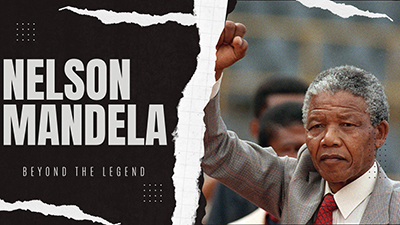
A Black History Moment:
Nelson Mandela: Beyond the Legend
By Ramon Robison
Nelson Mandela, the iconic figure whose name is synonymous with the fight against apartheid and the pursuit of justice, continues to inspire people around the world. His remarkable life and legacy are well-documented, but there are some lesser-known aspects of his journey that offer a more nuanced understanding of the man behind the legend.
Early Activism: The Birth of a Leader
Before he became a global symbol of resistance against apartheid, Nelson Mandela was an active member of the African National Congress (ANC) and played a pivotal role in co-founding the ANC Youth League in 1944. This early activism laid the groundwork for his remarkable political career. The ANC Youth League energized the anti-apartheid movement, advocating for the rights of black South Africans and setting the stage for the long and arduous struggle that lay ahead.
A Lawyer by Profession
Mandela’s pursuit of justice took various forms, including his early career as a lawyer. He studied law at the University of Fort Hare and later at the University of Witwatersrand. As a lawyer, he represented clients who faced discrimination under apartheid laws, fighting for their rights within the legal system. This period of his life highlighted his commitment to justice and equality, which would become the cornerstone of his later activism.
Embracing Armed Struggle
While Mandela is widely associated with nonviolent resistance, he also recognized the necessity of armed struggle in the fight against apartheid. In the early 1960s, he co-founded Umkhonto we Sizwe (MK), the armed wing of the ANC. MK carried out acts of sabotage against government infrastructure, marking a significant shift in the anti-apartheid struggle. This approach emphasized the need for both nonviolent and armed resistance to achieve the ultimate goal of ending apartheid.
The “Madiba” Nickname
Nelson Mandela is affectionately known as “Madiba” by many South Africans. This less-known nickname has its roots in Mandela’s Xhosa clan name, which is a term of respect and endearment. It reflects the deep admiration and love that South Africans have for their iconic leader and signifies the profound impact he had on their lives.
The Boxing Enthusiast
In his youth, Nelson Mandela was an avid boxer and enjoyed the sport. He participated in amateur boxing during his time at the University of Fort Hare and continued his involvement when he moved to Johannesburg. His boxing experiences taught him the value of discipline, strategy, and resilience, qualities that would serve him well in the political arena.
Nobel Peace Prize: Shared Honor
While many are aware that Nelson Mandela was awarded the Nobel Peace Prize in 1993, it is less commonly known that he shared this prestigious honor with F.W. de Klerk, the South African president who played a pivotal role in ending apartheid and negotiating the transition to majority rule. This shared Nobel Peace Prize symbolized the collaborative efforts of both black and white leaders in South Africa to bring about a peaceful end to apartheid and foster reconciliation.
The Artist Within
Not many people know that Nelson Mandela had a hidden talent: he was an accomplished artist. He discovered his passion for painting during his 27-year imprisonment on Robben Island. His artwork often depicted the South African landscapes and scenes from his own life. Mandela’s paintings have been exhibited all over the world, revealing a different side of the iconic leader – a creative, introspective, and deeply connected person to the land he loved.
Secret Letters from Prison
Throughout his lengthy imprisonment, Mandela engaged in covert correspondence with other prisoners. These letters were vital as they provided not only emotional encouragement but also served as a vital conduit for exchanging information about political developments occurring outside the prison walls. Such communication played a pivotal role in keeping Mandela and his fellow activists connected to the ongoing struggle against apartheid.
Tending a Garden in Isolation
Robben Island was a place of isolation and suffering, but Mandela found solace in a secret garden. He secretly tended a small garden while imprisoned, growing vegetables that provided him with sustenance. He also used the garden as a symbol of resilience and hope in the face of adversity. The garden remained hidden from the prison authorities for many years, a testament to Mandela’s ability to find beauty and strength even in the most challenging circumstances.
Nelson Mandela was a complex figure, with a life that was shaped by both personal and political experiences. While he is most widely known for his role in the fight against apartheid and his time as President, there are many lesser-known aspects of his life that provide a deeper understanding of his character. From his early activism and legal career to his embrace of armed struggle and his personal life, Mandela’s journey was marked by resilience, an unwavering commitment to justice, and a deep connection to his people. His legacy continues to inspire us, reminding us of the power of perseverance https://youtube.com/shorts/VEPHYec5m7s


Be the first to comment